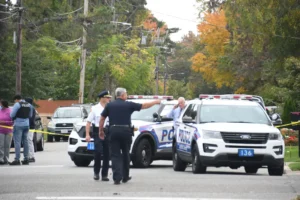
THE HEARING BEFORE THE INTER-AMERICAN COMMISSION ON HUMAN RIGHTS WILL ADDRESS THE URGENT NEED FOR ACCOUNTABILITY AND REDRESS FOR THE EXTRAJUDICIAL KILLINGS OF BLACK AMERICANS BY POLICE—ESTABLISHING A LEGAL BASIS AND FRAMEWORK FOR REPARATIONS.
Washington, D.C. (October 5, 2020)—A coalition of human rights and social justice organizations, including Robert F. Kennedy Human Rights, is set to testify before the Inter-American Commission on Human Rights (IACHR) as part of a hearing on structural racism and police violence in the United States.
The hearing will not only address the urgent need for police accountability and redress, but will also highlight how the prevailing culture of impunity in the U.S. has long violated standards upheld by international human rights law—providing a legal basis and framework for reparations for the countless Black Americans killed and injured by police.
The virtual hearing on Wednesday, October 7, at 11:00am ET is open to the public—you can register here—and will include testimony from:
- Collette Flanagan, founder of Mothers Against Police Brutality
- Gina Clayton-Johnson, founder and executive director of Essie Justice Group, part of the Movement for Black Lives
- Kerry Kennedy, president of Robert F. Kennedy Human Rights
- Justin Hansford, executive director of the Thurgood Marshall Civil Rights Center at Howard University
Immediately following the hearing, there will be a Q&A opportunity for the press and public to hear from more members of the coalition—including the ACLU, Center for Justice and Accountability, Mothers Against Police Brutality, the Movement for Black Lives, Robert F. Kennedy Human Rights, Santa Clara University School of Law International Human Rights Clinic, the Thurgood Marshall Civil Rights Center at Howard University, and the US Human Rights Network—on the concrete steps the United States should take to protect Black communities including divesting from police institutions and reinvesting in life-affirming alternatives for Black and other communities of color. You can register for that here.
“The Inter-American Commission has made it clear that reparations are not just a ‘nice to have’ but are a legally mandated and necessary step towards justice,” said Kerry Kennedy, president of Robert F. Kennedy Human Rights. “It’s time for the U.S. to take on its legal and moral responsibilities, obligations set forth by international human rights law, to meaningfully address our long sordid history of violent and racist law enforcement by divesting from policing and reinvesting in communities of color. This hearing is an important step in making that happen.”
This isn’t the first time the IACHR has publicly addressed systemic racism and police violence. In March 2019, the Commission released a groundbreaking report on how policing in the United States violates core human rights, specifically of Black Americans, and recommended urgent reforms to remedy the historical and structural roots of police violence. However, since the report was released, the U.S. has failed to implement any of the Commission’s recommendations in a meaningful way, fostering a culture of impunity that has left communities of color at increased risk of police violence.
The intent of this new hearing is to provide the IACHR with up to date information on the ongoing threat Black Americans face at the hands of police and urge the Commission to provide more concrete steps on how to carry out its recommendations on the federal, state, and local levels.
Robert F. Kennedy Human Rights
We are a non-partisan, not-for-profit organization that has worked to realize Robert F. Kennedy’s dream of a more just and peaceful world since 1968. In partnership with local activists, we advocate for key human rights issues—championing changemakers, and pursuing strategic litigation at home and around the world. And to ensure change that lasts, we foster a social-good approach to business and investment, and educate millions of students about human rights and social justice.




